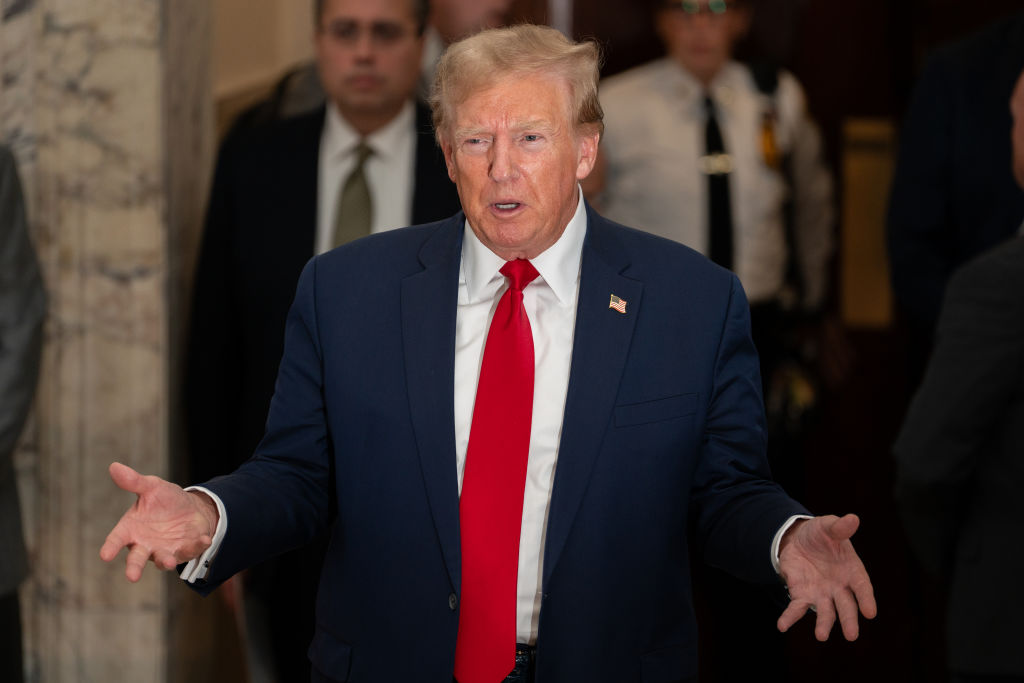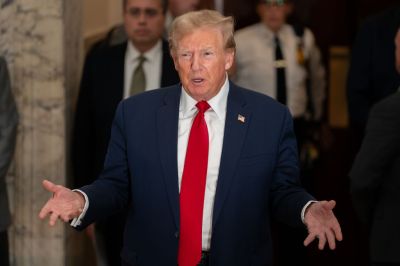Welcome back to The Collision! We’ve been on a slightly longer break than anticipated, but we’re back to discuss the ins and outs of presidential immunity. We’ll also have a bit on the very little attention paid to Donald Trump’s looming criminal trials during Wednesday night’s Republican presidential debate—which was the last televised presidential debate of the year, though CNN has two more GOP primary debates scheduled for early 2024.
The Docket
- A grand jury in Clark County, Nevada, has indicted six Republican electors who submitted certificates falsely claiming that Donald Trump, not Joe Biden, won the state in 2020. Among the defendants were state and local GOP officials, including Nevada party chairman Michael McDonald, Clark County party chairman Jesse Law, and Republican National Committeeman Jim DeGraffenreid. Nevada Attorney General Aaron Ford charged the six electors with “offering a false instrument for filing and uttering forged instruments,” the Las Vegas Review-Journal reported Wednesday.
- Trump was back in the Manhattan courtroom Thursday to attend his ongoing civil fraud trial, which is nearing its end. On December 11, the former president will be taking the stand for a second time in the trial, the results of a lawsuit brought by New York state attorney general Letitia James alleging Trump and his business associates (including three of his adult children) committed financial fraud by overvaluing his assets and net worth.
- A Hunter Biden update from the New York Times: “House Republicans on Wednesday threatened to hold Hunter Biden, the president’s son, in contempt of Congress if he did not appear for a closed-door deposition they scheduled for next week as they hunt for evidence to try to impeach his father.”
How Far Does Presidential Immunity Go?

There’s been a flurry of activity on one of the big questions surrounding the prosecutions of Donald Trump: How far does “presidential immunity” go when it comes to shielding him from prosecution or civil suits? Let’s get into it.
Less than a month after hearing arguments in the case, a three-judge panel from the federal appeals court in Washington, D.C., ruled last week that the lawsuit seeking civil damages brought by Capitol Police officers and some members of Congress who were at the Capitol on January 6, 2021, could move forward. In doing so, all three judges—including Trump appointee Gregory Katsas—held that former President Trump was not immune from being sued just because he was president when he spoke to the crowd on January 6. Instead, they held that a president is immune from being sued only when acting in his official capacity, as opposed to his personal capacity or in his capacity as a candidate for reelection.
The court also noted that it was not asked to determine whether the president’s speech on January 6 was protected by the First Amendment or whether presidential immunity could be invoked to protect certain papers from being turned over to the plaintiffs. Most notably, the court held that its analysis was limited to the context of a civil lawsuit—that is to say, the former president could still argue that he is immune from criminal liability under this same theory.
John Yoo, Berkley Law professor and former attorney in the Department of Justice who worked on these types of issues, told The Dispatch he was not surprised by the outcome at this point. “The main point where President Trump’s lawyers went too far was to essentially claim that the president had immunity from civil and criminal cases any time he was president, anytime he was speaking,” Yoo said.
But while the court rejected the most extreme arguments from the former president’s lawyers, the case is far from over. “A lot of this has really not been resolved by the Supreme Court,” Yoo added. “President Trump can still go up to the Supreme Court and press this broad theory.”
Of course, Trump may want to keep his Supreme Court powder dry—both on his presidential immunity and First Amendment defenses—for the criminal case about election interference before Judge Tanya Chutkan in the same courthouse. (Note: Trump is currently appealing the same issue in the criminal case to the D.C. Circuit, but it is unlikely the question will go to the same judges that decided this case.) There has always been a lower bar for suing a government official than bringing a criminal indictment, so it would make more sense to ask the Supreme Court first to review the stronger claim that Trump is immune from criminal prosecution for his role in the January 6 insurrection.
The purpose of presidential immunity, as the court held, “is to assure that he can fearlessly and impartially discharge the singularly weighty duties of the office.” If Trump decides to appeal the decision, he will argue that the original understanding of the Constitution was that the only way another branch could reach the person holding the office of the presidency was through the impeachment power. Since Trump has already been impeached and was acquitted, their theory goes, he cannot later be brought into court.
It would be a novel theory, to say the least. “This idea that you can’t be prosecuted for something you have been impeached for?” Yoo told The Dispatch. “The case law has never read it that way, the founders never read it that way.”
Just because they passed this hurdle doesn’t mean that the plaintiffs in this case have a clear runway to Trump’s money now. They’ll still have to show that their injuries that day were caused by Trump. But the court’s ruling did tell us two important things for the pending criminal indictments: how they are thinking about blanket presidential immunity and how quickly they can turn around decisions in these cases.
Christie Calls Out Trump—and His Primary Opponents
If you were under the false impression that Trump’s rivals for the Republican nomination might have used their debate in Tuscaloosa, Alabama, Wednesday night to lay into the frontrunner for his multiple criminal indictments—well, you should have read our colleague David Drucker’s debate preview earlier this week.
Matt Gorman, a veteran Republican strategist who had been the spokesman for Sen. Tim Scott’s presidential campaign, told David that going after Trump for his legal messes “doesn’t move a single vote in the Republican primaries.”
David also correctly predicted the lone exception on this front: former New Jersey Gov. Chris Christie, who has built his campaign around the idea that he is the only candidate willing to go after Trump directly, on the indictments and all other ways in which Trump is unfit for office.
Christie went after his fellow Republican candidates in one of the most remarkable moments of the GOP primary, the very first debate back in August in Milwaukee. The question back then was who on the stage would still support Trump if he were the nominee but were convicted of federal crimes.
“At the first debate, my three colleagues on this stage, when asked if he would be convicted of federal felonies, would they still support him, raised their hand, looked into the camera, and let everybody know that they would still support him, even if convicted of federal felonies,” Christie said Wednesday night. “Federal felonies, by the way, federal felonies which involve our election process, federal felonies which involve the most sensitive of our governmental secrets, federal felonies where he instructed others to commit crimes, folks who are now agreeing to go to jail because of what they did in his name.”
None of the other candidates tried to defend themselves or even defend Trump on the charges —a sign that Christie took to reveal fear of the most popular Republican in the field.
“Failing to speak out against him, making excuses for him, pretending that somehow he’s a victim empowers him. Do you want to know why those poll numbers are where they are? Because folks like these three guys on this stage make it seem like it’s conduct that’s acceptable,” Christie said.
Verbatim
Christie’s closing statement in Wednesday’s debate made an interesting point—assuming Trump is convicted of a felony before Election Day:
“I want you all to picture in your minds Election Day. You’ll all be heading to the polls to vote, and that’s something Donald Trump will not be able to do because he will be convicted of felonies before then, and his right to vote will be taken away.”







Please note that we at The Dispatch hold ourselves, our work, and our commenters to a higher standard than other places on the internet. We welcome comments that foster genuine debate or discussion—including comments critical of us or our work—but responses that include ad hominem attacks on fellow Dispatch members or are intended to stoke fear and anger may be moderated.
With your membership, you only have the ability to comment on The Morning Dispatch articles. Consider upgrading to join the conversation everywhere.